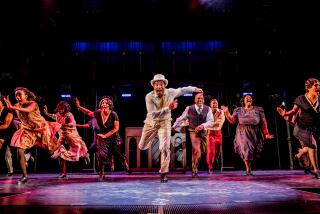Seattle’s hidden gem
- Share via
If the vision of Seattle as grunge city and the spawning ground for acts such as Pearl Jam, Nirvana and the Foo Fighters suggests that the only form of music with a significant presence in the city is rock, think again. Sunday’s performance by Seattle singer Greta Matassa in Beverly Hills at a fundraiser for the Rising Jazz Stars Foundation offered convincing evidence of the high-quality jazz in the Northwest’s largest metropolis.
Matassa’s performance was a marvel of virtuosity. She has been working lately on an album devoted to songs associated with Ray Charles, so numbers such as “Ruby,” “Danger Zone” and “Just for a Thrill” were prominent in her program. But the material also varied from Django Reinhardt’s “Nuages” and Benny Golson’s “Whisper Not” to Henry Mancini’s “Two for the Road” and the Mandel-Bergman classic, “Where Do You Start?”
That’s a daunting selection of material, but Matassa handled it with ease. On the Charles-related material, she captured the swing, the spirit and the emphatic gospel phrasing of the originals without resorting to mimicry. The instrumentally associated songs were propelled by an irresistible rhythmic drive and some impressive scat singing (including a quirky imitation of blues harmonica on “Baby All the Time”). And the ballads -- especially her touchingly intimate rendering of “Where Do You Start?” -- were the product of a singer who understands the significance of songs as slice-of-life mini-dramas.
Matassa’s two far-reaching sets also included a fiery romp through “Undecided,” in which she scat sang her way through a pair of gripping choruses without accompaniment, lovely renderings of Mel Torme’s “Born to Be Blue,” Michel Legrand’s “I Will Wait for You” and the standard, “Star Eyes,” all of it enhanced by her easygoing between-song comments. Her accompanists -- pianist Randy Halberstadt, bassist Clipper Anderson and drummer Gary Novak -- were up to the task of supporting her eclecticism.
The only question remaining at the close of this impressive outing was why Matassa has had so little visibility outside of the Northwest. Maybe life is just too good in Seattle to want to explore elsewhere.
More to Read
The biggest entertainment stories
Get our big stories about Hollywood, film, television, music, arts, culture and more right in your inbox as soon as they publish.
You may occasionally receive promotional content from the Los Angeles Times.









